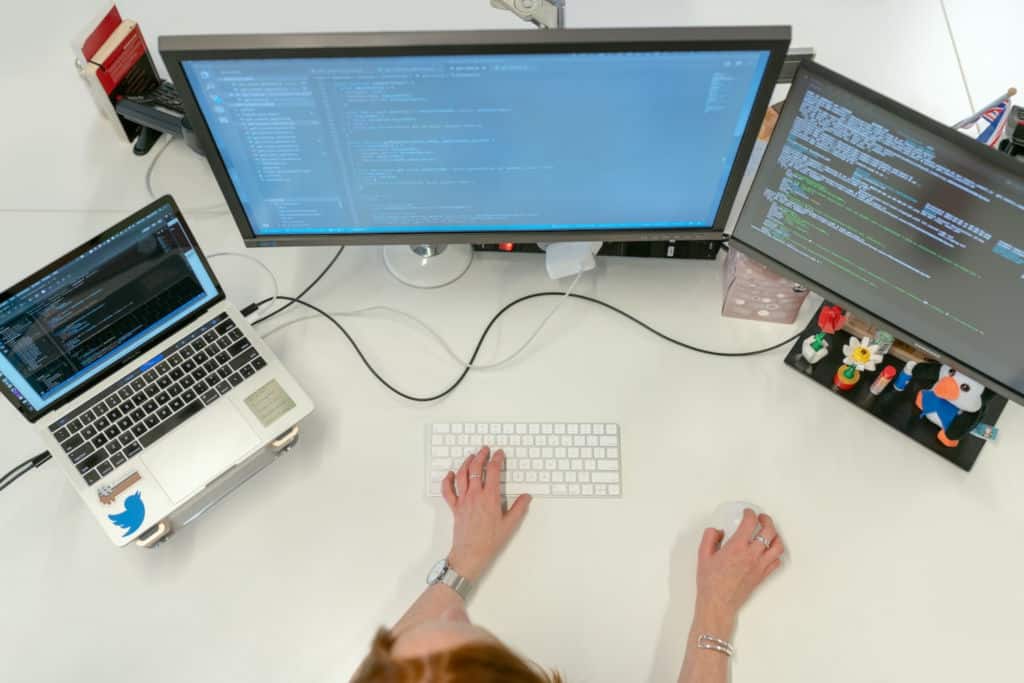Disclaimer: Some links in this article may earn us a commission at no cost to you. Learn more in our privacy policy.
Having a computer science degree or related is a decent qualification for most jobs at Microsoft. Sometimes, Microsoft just wants you to have a degree, any degree. But what about no degree, will that work?
While most Microsoft employees have some kind of degree, the truth is that Microsoft may hire you if you have no degree at all, but only for entry-level jobs. If you can perform well in an interview and have some experience, you have a decent chance of landing an entry-level job at Microsoft.
It’s worth noting that many Microsoft teams recognize the value of diverse skill sets and life experiences. Often, the best innovations come from those who view problems from a different perspective, which might be you, even without a traditional degree
What Does It Take To Get That Entry-Level Job Without a Degree?
These days, more and more software developers are self-taught, and even Microsoft executives have spoken openly about the requirements of a degree to work there. With the possibility available, don’t assume it’s going to be easy. There are many requirements you need to fulfill to be able to land a job without a degree.
While it is possible to get a job at Microsoft without a degree, it is not to be taken lightly. The recruitment process at Microsoft can be hard, but lucky for you, Microsoft will focus more on your skills and less on your degree, especially for a programming role. However, obtaining these skills takes time and practice.
Most people who don’t have any experience in coding will need to commit hundreds of hours of learning (20-30 hours a week), and at least 6 months of working on projects to be at least hireable for an entry-level job at Microsoft.
Having no degree or having a completely unrelated degree and thinking you can take some cheap bootcamp for 3 weeks and start making that FAANG money is unrealistic. While this is not achievable, long-term self-taught employees exist, at Microsoft and elsewhere.
If you fall into this group, then good news: there are tons of resources out there. If you’re completely new, you may want to start with Git and Github, CSS, HTML, Javascript, and Python. After you get a hang of those, the world will open up with all kinds of possibilities.
Given the tech giant’s numerous projects, ranging from cloud solutions to AI innovations, there’s a vast realm of opportunity for those willing to specialize. Even if you don’t have a degree, showcasing proficiency in a specific area Microsoft is exploring can set you apart.
Microsoft’s emphasis on skills rather than degrees reflects an industry-wide shift. However, if you’re targeting Microsoft specifically, understanding their company culture and mission can be just as crucial as mastering coding.
Beginner to coding? Here’s where to start
These are some of the best resources: If you’re looking for resources on everything in web dev, here’s a list of resources you’ll need to learn full-stack web development. You can start in Python from here, Microsoft Azure from here, and Java from here.
In the beginning, you’ll need to learn Git and build your GitHub portfolio of projects. Now every time you write a line of code goes into the online code repo. I suggest that you write something every day, so it looks like you’ve been working on something constantly. If not, then try at least 4 days a week. Everything you do, document on Github.
Go to Coursera or Udemy for learning and practicing, and you can get certifications along the way (such as the ones in Microsoft Azure cloud if relevant), and just study as much as you can. I mentioned Microsoft Azure because that’s the main skill Microsoft is looking for these days, and Microsoft certificates can help you get your foot through the door.
After that, you need to study how to crack the Microsoft Coding Interview. The preparation will depend on your level of understanding, practical skills, and experience. Expect at least a few months (weeks if you’re good) of preparation for the Microsoft coding interview.
As you can see, it’s not easy, but what it means is that it is possible. And that’s all it takes, the possibility.
Anecdotal evidence suggests that several successful Microsoft employees began their journey without a degree, but their passion, curiosity, and determination were unparalleled. They prepared not just for the role, but to be a part of Microsoft’s vision.
Will Having No Degree Affect Your Interview in Some Way?
Having no degree should not affect your interview in any way, because there is a reason why you were allowed to interview at all. If you’ve been called for a Microsoft interview, that means recruiters think you may be a good fit for the job, you have some experience, and they want to see more.
The whole point of getting an interview at Microsoft is to show off your skill. By the time you get that interview, you should be skilled enough to solve most problems they throw at you, as well as improve your communication a bit so you know how to explain your thought process.
Still, you should try to properly prepare for the interview, especially if it’s a coding interview. Take your time to practice at Leetcode, review algorithms and structures, and everything else needed to crack the Microsoft coding interview.
While a degree can serve as a validation of your skills, Microsoft’s rigorous interview process ensures that only the most capable and fit candidates get through. Remember, the focus is on what you can bring to the table today and in the future, not just your past.
How Much Do Programmers at Microsoft Make Without a Degree?
Since you’ll probably be working at an entry-level job, you can expect anywhere from $75,000 to $100,000+ in salary. Microsoft is known to pay well, and as you advance your salary will increase as well.
It’s probably not a good idea to worry about the salary in the beginning at all, just get that first FAANG company to take a chance on you and in a year or two, you can build that into something new.
Will Having No Degree Affect Your Chances of Promotions at Microsoft?
There is no evidence that having no degree affects your job promotions if you’ve been deserving. You’ll be under a contract, you’ll probably have a fair manager, and you’ll get a chance to prove yourself and get your first promotion in a year or so.
If you have no degree, you’ll probably be at an entry level at Microsoft, which means it’s only upward from here. When (and if) things start getting unfair and slow, you can always find a new job.
Just by being at Microsoft, having access to people much smarter than you, and having this as your experience can only help you greatly in your career.
Which Microsoft Jobs Don’t Require a Degree?
While this will mostly depend on the type of job, we can safely say that programming and data science entry-level jobs can be a bit easier to get if you have no degree, rather than jobs from other branches. This will of course depend on your experience level, so there are no rules.
The basics of programming can be self-taught, and paired with documented experience on Github and other depositories, as well as doing well on an interview may be enough to get into Microsoft these days. Their execs even confirmed this, although they also mentioned how soft skills are valued just the same, so keep working on that personality, teamwork, and communication.
Can Certificates Help You Get Hired at Microsoft if You Have No Degree?
While certs may not be nearly as valued as a degree or experience, the truth is certs (certificates, certifications) can show your willingness to learn and improve in your day-to-day work. Since you’ll probably be starting at an entry level, this is a good quality to have and to promote.
Even just learning while doing the cert will help you improve your skills and prepare you somewhat for an interview and the future at Microsoft.
Although Microsoft doesn’t strictly mandate a degree, they highly appreciate continuous learning. Acquiring certifications is not just about the title, but it’s a testament to your dedication to keeping your skills sharp and relevant.
Try Udemy and Coursera. Go for Microsoft certifications, especially the ones in Azure cloud if you’re looking to go that way, as well as an A+ CompTIA certificate, or anything you’re interested really.
And in the future, any new certification you get is a chance to get a higher salary, a chance to learn and improve your skills, as well as a chance for a potential new job and improved career.



